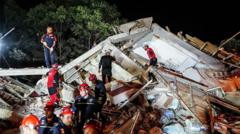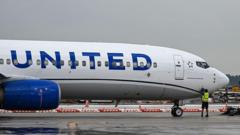Iran's missile attack on the Al-Udeid airbase in Qatar marks a significant escalation in ongoing hostilities following US airstrikes on its nuclear sites. With differing accounts of missile numbers and responses from global leaders, the situation remains volatile.
Iran Targets US Base in Qatar: Escalation Amid Strikes on Nuclear Sites

Iran Targets US Base in Qatar: Escalation Amid Strikes on Nuclear Sites
Iran has launched missile strikes against a US base in Qatar in retaliation for recent US bombings of its nuclear facilities, prompting regional tensions to rise.
Iran launched a barrage of missiles at a US military base in Qatar on Monday, a retaliatory act it announced following American airstrikes against its nuclear facilities over the weekend. Witnesses in Doha reported hearing explosions while videos captured air defense systems responding to the assault. Former US President Donald Trump characterized the attack as "weak" and indicated that this move could pave the way for peace in the region, coinciding with a ceasefire announcement amidst Israel-Iran hostilities.
Iranian state media confirmed the targeting of Al-Udeid, the largest US military base in the Middle East, with Iranian military officials insisting that the strike was a direct response to US bombings of three nuclear facilities that occurred that same weekend. Iran's Islamic Revolutionary Guard Corps (IRGC) stated, "Iran will not leave any attack on its sovereignty unanswered," asserting that US installations represent vulnerabilities, not strengths.
Contradictory reports emerged regarding the number of missiles launched, with Iran claiming six, while the US stated there were 14 and Qatar cited 19, all reportedly intercepted without casualties. In anticipation of the impending attack, both US and UK officials had advised their citizens in Qatar to "shelter in place," highlighting the growing tensions in the region. About 8,000 Americans and several thousand Britons reside in Qatar, amounting to a significant population affected by these developments.
In the aftermath, President Trump thanked Iran for providing advance notice that helped prevent loss of life, labeling the strike as a minor incident. Meanwhile, Qatar’s foreign ministry described the attack as a flagrant violation of national sovereignty, underlining the complexity of regional alliances. Supreme Leader Ayatollah Ali Khamenei emphasized that Iran would not tolerate violations, asserting the nation's right to defend its territory.
As a wave of attacks continued between Israel and Iran, Trumps' ceasefire proposal saw initial agreement from Israel, while Iran conditioned its compliance on Israeli cessation of hostilities. The dramatic escalation has heightened anxieties across the region, with air traffic disruptions and temporary airspace closures indicating the potential for further conflict.
The chain of events leading to the missile launch began shortly after Israel intensified its military operations against perceived threats from Iranian nuclear advancements, igniting fears of a broader confrontation. This development underscores the ongoing struggle for dominance and security in a region beset by military and diplomatic tensions.






















